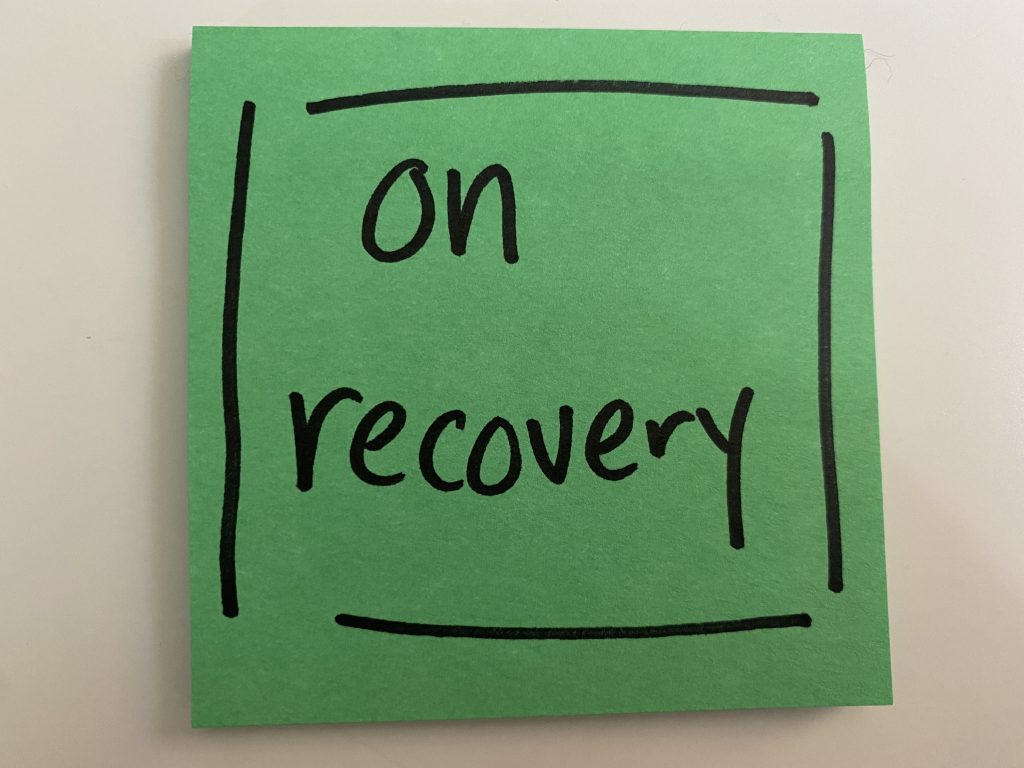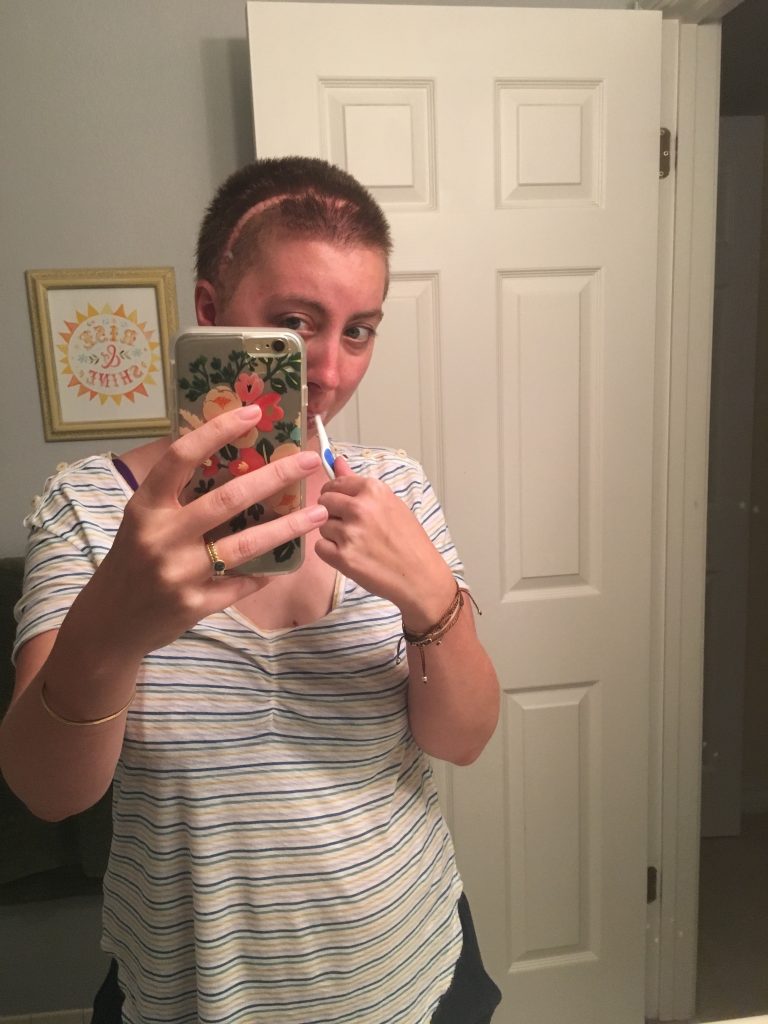
Five years ago this month, I had brain surgery to remove a (thankfully) benign brain tumor from my left temporal lobe. The story leading up to diagnosis, the experience of brain surgery and the massive evolution that happened inside me during that period is the subject of a book I’m writing (… in all of my free pandemic time. Ha.).
But today I want to write about recovery – not the initial, raw, messy weeks of post-op but the days that happened after my husband went back to work and my family flew home and the kids went to daycare.
In other words, the first days I was alone.
My neurosurgeon cleared me to drive that week so I packed up the kids and drove them 0.9 miles to their daycare. I don’t remember if I was tearful after drop-off; after all, they’d been continuing to go to daycare the whole time. The day was the same for them, only new for me.
That first day, I drove. I drove to downtown Oakland and all around its streets, winding into San Leandro and eventually back up San Pablo Avenue towards Berkeley. I drove into the hills of El Cerrito, turning back towards the flats when cell service got spotty. I didn’t listen to music; overstimulation was definitely an issue for my brain in those early days. I just kept driving, kept making choices about going left or right or straight ahead – choices that blissfully had no stakes.
At this point, you have to know – I was looking rough. I had a recently-shaved head with very short hair, featuring a giant, intense-looking scar from ear to ear. I had no desire to see anyone, to tell them what had happened, to account for their energies or reactions.

Looking back, I can see that I had a lot of nervous energy to work out. Ignoring the trauma that had just happened to my body, it had been so. many. years. of showing up on time with a plan. I was 35 years old with a graduate degree, a young business, two kids and an intense streak of volunteering for everything that came along. Faced with weeks of completely detached free time, how would a person like me make sense of this?
All I can say is that my recovery needs were so deep that zero commitments was all I could do.
—
I’m writing about this today because I hope we’re on the precipice of some recovery in our Covid world and – to be frank – I think many of us have no freaking idea how to recover. Our needs are deep. We have just passed the one-year mark of Covid, which has been an extraordinarily awful time – for health, for anxiety, for social justice, for politics, for communities and for our families.
I watch clients in my world who have been good students for so long, incessantly challenged to be rockstars at work, I’ll-work-during-parental-leave and of-course-I-work-evenings-and-weekends, chasing some version of 100% exceeds-expectations team player. Some days it makes me angry to see them so hard on themselves; other days I want to call up their bosses and say something unprofessional like “IF YOU HAVE BUILT YOUR BUSINESS ON SUCH THIN MARGINS, YOU ARE V BAD AT BUSINESS.”
And before I hate on the overachievers or their bosses too much, here’s the out: I think we’re stretching to be amazing at work because we don’t have many models for what amazing in life looks like. Amazing in life means you know that there are seasons for things — that it isn’t even remotely interesting to run a marathon every day, that our days and lives are more diverse, more nuanced, more editable and more unpredictable than work stress allows for.
And amazing in life knows that recovery is one of the most important seasons there is.
—
After that first day, I eventually found other things to do. I remember once going to the library and browsing all morning. I found a book about Frida Khalo and I read it on the couch for a long time, thinking about how painful her life must have been – but that she made beautiful things out of it. I started attending a yoga class twice a week and I never spoke to anyone other than waving to the teacher. (If you know me, you know that is SHOCKING behavior for me. I mean, really.) I wanted so badly to be anonymous and invisible so I could avoid all questions of identity.
Some days I went to a coffee shop, put headphones in my ears (social barrier) and people-watched. Some days I worked on writing my book. And generally I took a lot of silent walks to marvel at the beauty of flowers and everything people had invented. (Skateboards! Lawn ornaments! BUBBLES!)
Even after my brain could handle music again, it nearly always brought me to tears. Didn’t matter what it was, I would hear music and be flooded with emotion, gratitude, confusion and sadness… so I kept things mostly silent for a while. I was probably trying to control the uncontrollable; there was a lot to process back then.
Maybe after the past year, you, too, have a hard time with music. Maybe you’re aching to be invisible. Maybe you have a lot to process right now, today.
I see you. Anonymously, I see you, dear friend. It’s not forever – take a quiet walk, see some flowers. Buy some bubbles. It’s a season of recovery.
—
If this all resonates, here’s a recipe for early days pandemic recovery:
- Time, without limits, with zero “shoulds.” No “I should really check email once before breakfast” or “I should throw in laundry while I watch TV.” No shoulds.
- Preferably, more than a week. Recovery will take longer than you think – but you’ll also be surprised how quickly some percentage of you comes back. Use your PTO absurdly. Stack it, 3 weeks deep, if you can. Or if you normally use PTO like that, do the opposite – book Fridays off for 3 months.
- Be aimless. Find an activity that has very low stakes and something that you will get bored by. (Indeed, after 2 hours of driving around the East Bay, I got hungry and went home.) Driving or walking or painting or watching TV might work. Do it until you’re tired of it; when is the last time you stopped something without a scheduled end time?!
- Be quiet and alone. It has probably been so long since you heard yourself clearly. I suspect you have things to tell yourself.
- Be patient. Recovery is only a season. Maybe blooming is next. <3